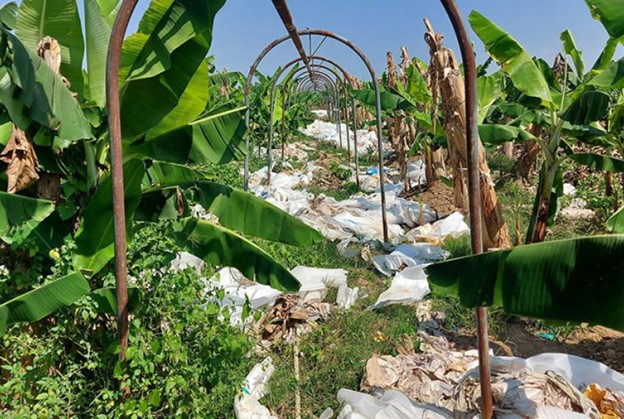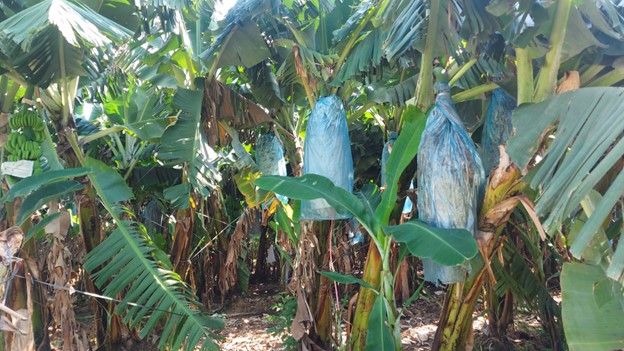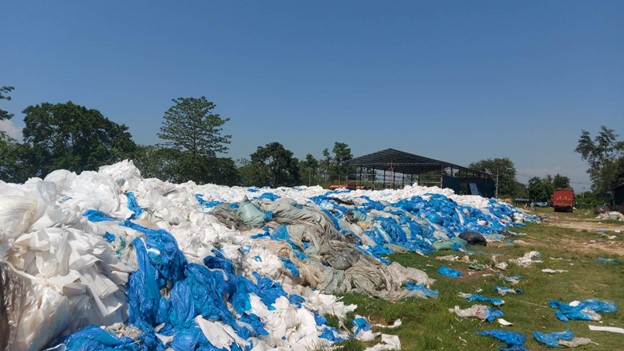Article: Banana Plantations Causing Serious Plastic Waste Issue
By Htun Lin Aung
02, May 2023
As soon as you enter the tissue – banana plantations in Sankar Village, Waing Maw Township, Kachin State, you will see banana leaves covered with light blue plastic.
Banana plants with large leaves are held up by plastic ropes.
If banana plants have a lot of large leaves, plastic ropes are woven over them like a web. Thus banana leaves look bigger as they are covered with as many as three layers of plastic sheets. Pieces of white foam, being used as a cushion to protect the fruits, line the pathways where banana laden trees are to be carried along.
In plantations where bananas have been harvested, there are heaps of charred plastic remains left from burning.
Stacks of plastic are scattered around nearby paddy fields and farmlands. Piles of plastic can be seen in the streams and fisheries close-by.
Plastic is seen everywhere.
As of 2019, the tissue banana plantations in Kachin State, using a large quantity of plastic, extended over an area of more than 140,000 acres (56,656 hectares), according to the latest data collected by the land security and environmental protection network.
Tissue culture banana farming exists along the eastern bank of the N’Mai Kha River and the eastern bank of the Ayeyarwady River the townships as Chipwe, Waing Maw, Myitkyina, Moe Mauk, Bamaw, Mansi and Shwegu as well as Daw Phon Yan area.
There are more than two hundred million plants in total and it is an agricultural industry that uses more than 300,000 Viss (over 5,000 tons) of plastic per year.
Plantations of tissue banana that use a large quantity of plastic
Tissue banana was introduced to Manweingyi area in the upper part of Waing Maw Township in Kachin State in 2008 as a substitute crop as part of the anti-opium campaign.
By 2016-2017, tissue banana plantations spread to the areas where there was no poppy cultivation at all in locations such as the lower part of Waing Maw Township, Myitkyina, Moe Mauk, Mansi and Shwegu Townships and Daw Phon Yan.
The Kachin State crop producer’s association is responsible from the Myanmar side for providing services while traders and producers of agricultural crops from China take responsibility for cultivation and production.
Much plastic piping is also laid in the fields where banana saplings are transplanted.
Around 1,400 banana saplings can be planted per acre. They grow and produce bunches of bananas after eight months. At this stage, caps, blue pieces of plastic and wrapping foam are used.
For every 500 plants, it is learnt that 77.5 viss (130.2 kilos) of plastic is used from the stages of fruiting to harvesting. These plastics coverings are produced by 13 factories in Myanmar with plastic seeds brought in from China. The theme of this year’s World Environment Day is “Solutions to Plastic Pollution”. It highlights the urgency of the issue to be deal with. Plastic can take anywhere from ten to hundreds of years to decompose depending on type. Plastic waste pollutes water, land, and air, and gases released from burning plastic cause long-term health problems.
Tenants and farms next to banana plantations suffer
Tissue banana plants are grown around six feet apart, and after their produce is taken away, the plastic covered plants are then cut down and disposed of into trenches. Before the start of the next banana planting season, the plastic is set on fire leaving plastic waste that look like hard concrete blocks.
U Sai Ling from Khatcho village who leases out his field said, “I used to grow corn. But I made this choice to lease out to banana plantation as there were floodings and heavy rainfall and unpredictability about corn prices during harvest. There have been instructions not to leave plastic waste and sheets. However, a large volume of burnt plastic is observed. I don’t know what their negative effects will be.”
“It has been found that some plants did not grow well because of plastic waste. Most of them have been disposed of by farmers. Some of them are buried deep during the ploughing process.” said U Sudar San of Sankar village.
“The roots couldn’t penetrate the plastic layer. The ward administrator also issued a letter to ensure that no plastic remains in the fields. In this area, there are few people who take it seriously. The farmers still don’t know to what extent the soil can be affected. Three cows in our village also died after having eaten plastics that caused intestinal blockage” he added.
U Sai Ba Aye, a farmer from Ulok Village, said that he does not rely on any organization to solve the problem of plastic being found in his field but solves the problem by himself.
“If the plastic waste comes from a nearby field, the banana plantation owner is informed. The drains from the banana plantations are connected to the Ayeyarwady River. If the water level rises, all the garbage from the drains will end up in my field. Due to the thriving banana business, many people have come to the area and the drains are also filled with garbage. It’s annoying to see it every year” he further stated.
U Htay Lwin, director of the Kachin State Department of Agriculture, said that banana plantation companies are being trained on GAP (Good Agricultural Practices), that in the land lease agreement, terms shall be fair to both parties and that farmers shall lodge a complaint with the department concerned if they feel that their farms have been adversely affected.
“What we can do is check at the border check point. When the crops are harvested, we check for chemical residues. We can’t carry out field surveys because the agricultural work has not been officially registered. There is not enough supervision” he said.
A member of the Kachin State environmental conservation committee commented that the tissue culture banana plantations have existed in the upper part of Waing Maw Township for more than ten years and its lower part for around six years. However, “How taxes on imported plastic products shall be levied at the border check points, how they shall be recycled and properly disposed of have never been regulated. As a consequence, there is a great danger of seriously damaging alluvial soil along the banks of the Ayeyarwady River,” he added.
Other main reasons are not reserving watersheds and not keeping buffer zones between plantations that will cause water scarcity and seriously affect the ecosystem. According to the latest survey, environmental impact of ecosystem services fell by 16 percent in Waing Maw Township. Vegetables and fish are less available from forests and streams. The side effects of tissue banana plantations have passed the “danger point” he said.
Fishermen are facing difficulties
Waste material such as plastic waste in this area is carried along drainage ditches, streams and fisheries and it eventually flows into the Ayeyarwady River.
According to a survey jointly conducted in 2019 by Fauna and Flora International (FFI) and Thant Myanmar in, 119 tons of plastic flowed into the Ayeyarwady River every day.
Ko Pho Thein, a fishery owner said, “We can somehow deal with the issue of the plastic disposed from banana plantations to nearby fisheries. However, we can’t do much with the garbage carried along the drains.”
Most of our fisheries dry out during the hot season and get water during the rains. Only when water from the Ayeyarwady flows into our fisheries, fish come along. When the water level rises, piles of garbage will float like rafts. They don’t decompose. I don’t really know what will happen to them eventually. Since the cultivation of tissue culture bananas, less and less fish are caught each year. As far as I am concerned, there are few people who tendered for fisheries located along the banks of streams where there are tissue culture banana plantations.
U Saw Aung Le Htut Lwin from Kachin State Department of Fisheries of said that they haven’t been able to educate people on the issue of plastic, and that the water has declined in quality due to plastic and other waste.
“Water from every stream and river is no longer fit for people to drink like in the past. Some sources of water are harmful even to animals. The quality of the water affects the health of the fish. Less and less fish are available” he said.
Most fishermen said that before the introduction of tissue bananas, they used to get big fish that weighed over 10 viss (16.8 kilos) every year, but the number of catches of such kind this year is rare.
A fisherman who was fishing somewhere in Khat Cho fishery area said, “Fish have been scarce before these banana plantations were introduced. When these banana plantations thrive, the situation got much worse, and they became increasingly scarce. Unless we take immediate action to reverse this state of affairs, I imagine the fish stock will disappear altogether in the next ten years and we might need to draw a picture of fish to recall what they look like” he said.
The customs duties and revenue, responsibility and accountability
Commercial tax of 400,000 kyat and the state development fund amounting to 220,000 kyat totaling more than 600,000 kyat are being collected at Kanpaitee border check point for every haulage truck carrying tissue bananas from Kachin State.
There is no separate tax collected for plastic seeds imported from China. According to figures from the Kachin State Government, revenues collected were over 23 million kyat in 2013-14 financial year, more than 81 million in 2014-15; over 67 million in 2015-16; more than 1,255 million in 2016-17 and over 2,276 million in 2017-18 respectively.
Plantation owners pay as much as 1.4 billion kyat to the Kachin Independence Organization/ Kachin Independence Army, KIO/KIA as taxes every year, according to those working in the industry.
Tissue culture banana plantations produce a large amount of plastic waste and people are suffering. However, neither the government nor the ethnic armed organizations are taking necessary steps to solve the issue of land, water and air pollution. caused by plastic waste.
A banana entrepreneur said, “There are 17 check points when you go from Waing Maw to Kan Pai Tee, China border check point. As mentioned earlier, more than 600,000 kyat is paid officially to the government. More than that amount is spent on paying people assigned at those check points. However, nobody wants to take responsibility for any issue that arises” he said.
Recyling business is still ongoing stage
“The Kachin State crop producer’s association, which is in charge of tissue banana cultivation, used to play a less managerial role in the past, but now they are working hard to help solve the plastic waste issue by taking initiatives on recycling of plastic” said U Larik.
“We want to make sure that there is no burning of plastic. We ask the planters to dig a pit 12 feet deep and bury the plastic waste in it. We discussed how to save the earth. Those working in the industry faced a lot of losses and other financial problems, so they can’t do anything more to help conserve the environment anymore” he said.
There are 16 large recycling shops along Bala Min Htin Bridge to a bridge located at the entrance to the town of Waing Maw. These shops resell their purchases in Mandalay. There are four or five junk shops in each village near the tissue culture banana plantations. These shops pay 300 kyat per viss for the plastic waste and resell it at 400 kyat. Most of those operators were people from Sagaing Region who migrated there following the significant political change in 2021.
Ko Mya Nyo, who has a junk shop in Ulok village, said, “We collect everything from the plantations except foams. We get around 30 viss of recyclables every day. When I arrived first, the entire plantations were filled with plastic waste. Now there are many recyclers and each of them can collect less.”
“In Mandalay, manufacturing sector suffers due to power shortage. There is less demand for recyclables, and consequently, the prices of cardboard and plastic are falling. I can still make ends meet. However, I can’t even afford to buy a second-hand motorcycle” he added.
“Kachin State imports plastic seeds from China. Factories in Kachin State turn them into plastic to be used in tissue banana plantations. In order to help solve the plastic issue, a recycling factory is under construction in Sankar Village. Raw materials are being collected and machinery is still being installed now” said U Tun Tun Lat, Secretary of Kachin State crop producers’ association.
“We are now taking necessary steps. We should be able to solve the plastic waste issue. I hope we will soon reap benefits” he said.
A leader of the Kachin natural environmental conservation association said that recycling plastic waste is one of the best ways to deal with the issue. What we are seeing now is that plastic is being burnt to solve the problem. People shall come to realize that what they are doing is releasing toxic chemicals that pollute our air. These days, Myitkyina sees the highest temperature on record. We reap what we sow. We shall all work together to solve the plastic issue.
Author: Tun Lin Aung (Myitkyina)



